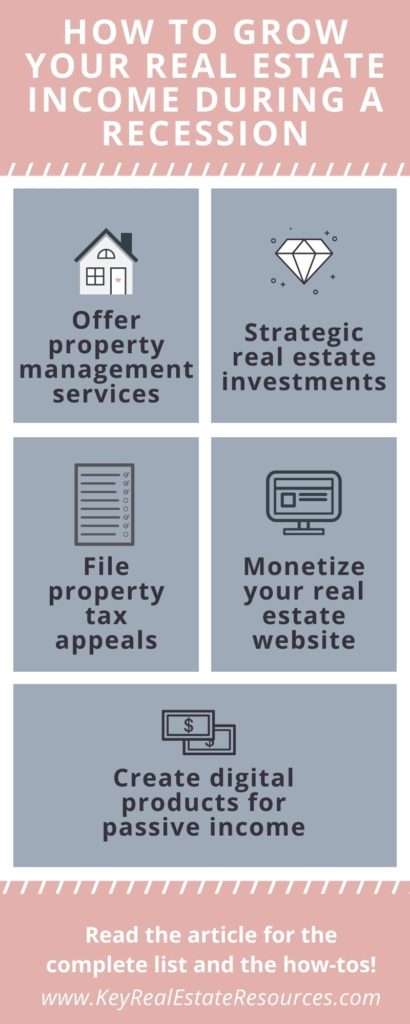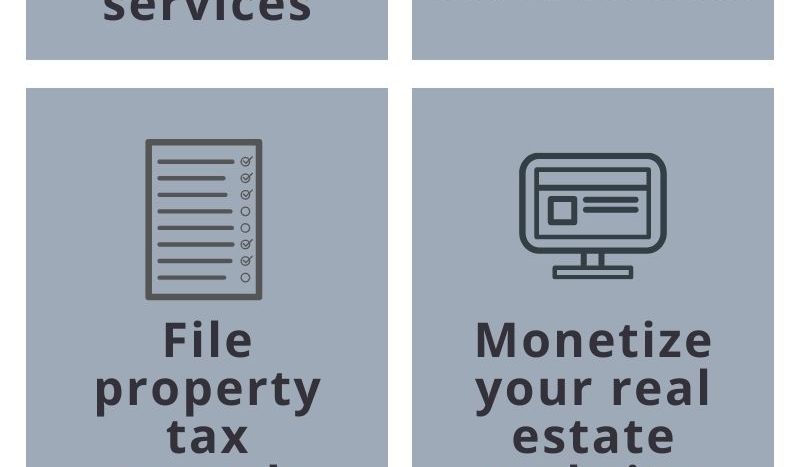What’s your plan to grow your real estate income during the next recession?
Are you going to double-down on prospecting and hope there are enough buyers and sellers in the market to keep you afloat?
Or do you have a clever way to infuse your real estate business with a fresh income stream?
Now, I’m not saying prospecting alone won’t work. But when real estate agents rely solely on real estate commissions, a recession can be disastrous. Business-ending even. If you were in the industry from 2009-2012, you know I’m not exaggerating.
Diversifying your income gives you a better chance at, not just surviving, but thriving during the next recession.
Growing your real estate business income during a recession is one of my favorite topics! I love that today’s agents are willing to innovate to provide greater value to their clients, grow their client base, and create an entirely new income stream.
In this post, we’re going to discuss some seriously clever ways to grow your real estate income during the next recession.
Expand Your Service Offerings
If you only represent clients in the purchase and sale of property, you’re leaving money on the table. During a hot market, that may be just fine; after all, there are only so many hours in the day, and if there are enough real estate transactions to keep you busy, why add new services? But during a recession, you have a golden opportunity to launch an entirely new income stream.
In fact, certain real estate-related services perform better in a down market. So when the market is strong, you can largely ignore these, but when the market softens, you’ll be glad to ramp up your efforts on these recession-proof services.
Credit repair
In a down market, lenders are more cautious about lending to buyers with iffy credit. Bad news for agents who don’t know how to work with low-credit buyers; excellent news for agents who offer credit repair services.
Not only do you help someone in need repair their credit (and get paid a reasonable fee for your services!), but you’re also saving your sale now that these buyers can qualify for a home loan!
Property management
In many markets, a down housing market actually makes the rental market stronger. Lots of potential sellers don’t want to sell during a down market, so instead of selling when they have to relocate, they opt to rent out their home. And there is also an influx of SFR renters who can’t qualify for a home loan under the more stringent lender requirements.
Offering property management services is a great way to earn a solid income while connecting with tomorrow’s buyers and sellers.
Property tax appeals
Only the savviest agents consider property tax appeals. Most agents just think boring… and completely ignore this killer opportunity. But real estate agents already have about 90% of the skills and knowledge needed to offer property tax appeal services!
All you have to do is show your local taxing authority that the value of your client’s home has dropped due to the recession, so their property taxes need to be adjusted accordingly. In most jurisdictions, this just means filing an appeal application and presenting a CMA to the Appeals Board to show them the current market value of the property. Then you get a percentage of the tax savings/refund as your fee.
It’s super easy to get started and incredibly lucrative in a declining market!
Invest in Real Estate
A recession is the perfect time to invest in real estate. You can grab properties for a fraction of their hot-market prices.
While timing the market perfectly requires a bit of luck, you don’t need to have perfect timing to get a smoking deal. Even if you buy slightly before or after your market bottoms out, you’ll still come out ahead when the market rebounds.
One word of caution: if your market loses a major employer due to the recession, your market may struggle to rebound. I’m talking about those towns where 25% of the population is employed by the steel mill or the coal industry. A severe jobs loss could prevent the housing market from ever rebounding if it forces people to relocate out of the area. But, barring that extreme case, down markets will always rebound eventually.
If you read our post on 18 Different Ways to Invest in Real Estate, you know you have lots of investing options. So what kind of real estate investing should you tackle in a recession? And which methods should you avoid?
Real Estate Investments Well-Suited to a Recession
Buy-and-hold properties for long-term residential renters are my personal favorite recession-friendly investment. By buying when values are low, you’ll keep your carrying costs low, immediately improving your cash flows. You’ll also enjoy strong appreciation as the market rebounds. And if your state observes limits on annual property tax increases, you’re also locking in low base rates for property tax purposes. Plus, people need a place to live, recession or not. So you shouldn’t have any more trouble finding renters than in a strong market.
I bought my first investment property in 2012 when the LA market bottomed out. Normally, LA is a tough market for residential buy-and-holds because the high housing prices create a cost barrier to entry. But I found a short-sale for about 10% under (the already low) market value. I bought the house for $395K and invested $25K in renovations. The house has now doubled in value and cash flows about $1,000 net per month, and my property taxes are still super low for the area. None of that would have happened if I’d purchased the property during a strong market.
Real Estate Investments to Avoid During a Recession
A recession is not the time for fix-and-flips. When properties are losing value by the week, your investment property will also lose value while you’re rehabbing it. This is an uphill battle you don’t need.
Commercial and industrial properties are also a risky investment during a recession. While you might get the property for a low price, you may struggle to find a tenant for your commercial/industrial space during the recession. You might find a diamond in the rough, but exercise extreme caution when buying a non-residential property during a recession.
Same with vacation rentals. Recessions make people more careful with their money, so people are less likely to spend on luxuries like vacations. Even if you get a good deal on the property, you may struggle with occupancy and cash flow.

Create a Product
When the market slows and you find yourself with a little more time on your hands, put that time to good use by creating a product that will generate passive income for years to come!
The most common example of product creation by real estate agents is eBooks. As an agent, you have special knowledge that everyday people simply don’t have. You know how to invest in real estate, take advantage of tax liens or tax deeds, launch a real estate business, stage a property to sell, etc, etc, etc. Why not package that knowledge into an eBook, eCourse, or other digital product (like templates, designs, or forms)?
Products require a substantial time investment on the front end for creation and promotion. But then you can watch the passive income roll in.
We have several resources to help you with your product creation. Check out our specific posts for:
Turn your real estate blog into a separate income stream
Agents who want to show up in Google results know the power of blogging. So they blog for leads, not for a separate income stream. But why not do both? Monetizing your real estate blog won’t make you rich, but it will give you a little extra income every month. And if you’re already blogging for leads (which, why wouldn’t you be?!), it doesn’t take much extra time or effort to make some money from your blog.
Here are some of the best ways to make money from your real estate blog.
Affiliate Links
Affiliate links are a no-brainer for bloggers! They’re simply links to products or services you recommend; when a reader uses your link to buy that product or service, you earn a small commission. It’s a win for your audience who gets introduced to the best products and services available, for the businesses who make a sale, and for you as the commission-earner.
You’ll find affiliate links all over this website. I often recommend books for real estate agents from Amazon.com, web hosting from Bluehost, and Etsy for creative real estate marketing tools. And yes, each of those links is a working affiliate link 😉
Sponsored Posts
As the name implies, sponsored posts are posts that are sponsored by a company. Companies will pay you for a mention on your site and a link back to their own website.
Let’s say, for example, that you’re writing a blog post for homeowners about plumbing maintenance. You probably already have a plumber you trust and would recommend. So reach out to that plumber and ask if they’re interested in sponsoring your blog post about plumbing maintenance. Your sponsor pays you a one-time fee, and they get the SEO boost from your backlink plus the valuable referral to all your clients. Depending on the size of your audience, you could get anywhere from $20 to $250+ for your post.
As your audience grows, media companies may even send you custom posts for your website. They write the post, and you earn a fee just for publishing it to your site. As long as you retain the editing rights and support everything in the article, there’s no reason not to publish a couple of these posts per month for quick and easy income.
For more ideas, like ads and members-only content, check out How to Make Money Blogging About Real Estate.
Get a Small Win
Great victories are made possible by small wins. Before you move on with the rest of your day, get a small win.
Today’s small win challenge is to commit to at least one of these recession-proof income streams to grow your real estate income during the next recession. Let us know which method(s) you chose in the comments so we can try to tailor future posts around the most popular income streams!
Get Your Complete Recession-Proof Guide!
If you’re serious about growing your real estate business during a slow market, check out The Recession-Proof Real Estate Agent. This book offers a complete step-by-step guide to recession-proofing your real estate business.











